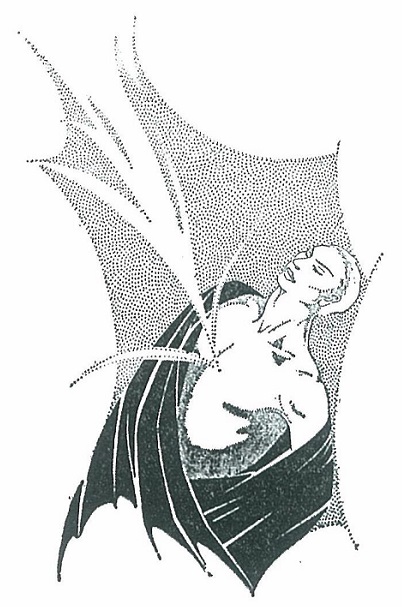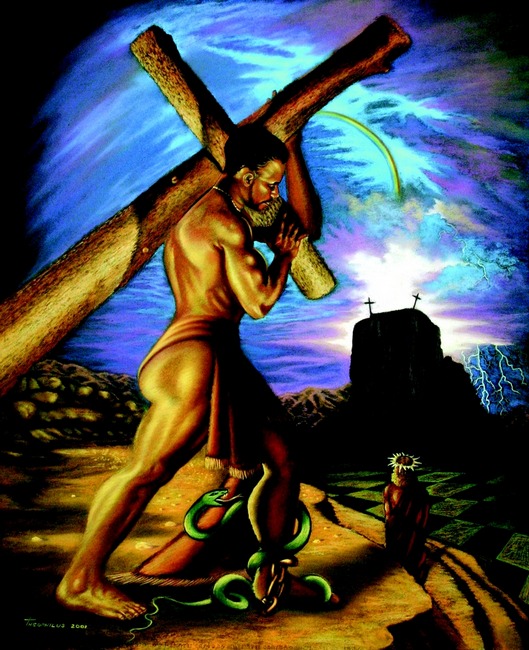Countee Cullen: poems from “The Black Christ” (1929) and “Color” (1925)
Posted: February 22, 2016 Filed under: Countee Cullen, English | Tags: Black History Month poems, Harlem Renaissance poets Comments Off on Countee Cullen: poems from “The Black Christ” (1929) and “Color” (1925)Poems from The Black Christ and Other Poems (1929) by Countee Cullen (1903-1946)
. . .
Little Sonnet to Little Friends
.
Let me not the proud of heart condemn
Me that I mould my ways to hers,
Groping for healing in a hem
No wind of passion ever stirs;
Nor let them sweetly pity me
When I am out of sound and sight;
They waste their time and energy;
No mares encumber me at night.
.
Always a trifle fond and strange,
And some have said a bit bizarre,
Say, “Here’s the sun,” I would not change
It for my dead and burnt-out star.
Shine as it will, I have no doubt
Some day the sun, too, may go out.
. . .
Mood
.
I think an impulse stronger than my mind
May some day grasp a knife, unloose a vial,
Or with a little leaden ball unbind
The cords that tie me to the rank and file.
My hands grow quarrelsome with bitterness,
And darkly bent upon the final fray;
Night with its stars upon a grave seems less
Indecent than the too complacent day.
.
God knows I would be kind, let live, speak fair,
Requite an honest debt with more than just,
And love for Christ’s dear sake these shapes that wear
A pride that had its genesis in dust,–
The meek are promised much in a book I know
But one grows weary turning cheek to blow.
Minutely Hurt
.
Since I was minutely hurt,
Giant griefs and woes
Only find me staunchly girt
Against all other blows.
.
Once an atom cracks the heart
All is done and said;
Poison, steel, and fiery dart
May then be buffeted.
. . .
Revelation
.
Pity me, I said;
But you cried, Pity you;
And suddenly I saw
Higher than my own grief grew.
I saw a tree of woe so tall,
So deeply boughed with grief,
That matched with it my bitter plant
Was dwarfed into a leaf.
. . .
Song in Spite of Myself
.
Never love with all your heart,
It only ends in aching;
And bit by bit to the smallest part
That organ will be breaking.
.
Never love with all your mind,
It only ends in fretting;
In musing on sweet joys behind,
Too poignant for forgetting.
.
Never love with all your soul,
For such there is no ending,
Though a mind that frets may find control,
And a shattered heart find mending.
.
Give but a grain of the heart’s rich seed,
Confine some under cover,
And when love goes, bid him God-speed.
And find another lover.
. . .
One Day I Told My Love
.
One day I told my love my heart,
Disclosed it out and in;
I let her read the ill-writ chart
Small with virtue, big with sin.
.
I took it from the hidden socket
Where it was wont to grieve;
“I’ll turn it,” I said, “into a locket,
Or a bright band for your sleeve.”
.
I let her hold the naked thing
No one had seen before;
And had she willed, her hand might wring
It dry and drop it to the floor.
.
It was a gentle thing she did,
The wisest and the best;
“The proper place for a heart,” she said
“Is back in the sheltering breast.”
. . .
Black Majesty
(After reading John W. Vandercook’s chronicle of sable glory)
.
These men were kings, albeit they were black,
Christophe and Dessalines and L’Ouverture;
Their majesty has made me turn my back
Upon a plaint I once shaped to endure.
These men were black, I say, but they were crowned
And purple-clad, however brief their time.
Stifle your agony; let grief be drowned;
We know joy had a day once and a clime.
.
Dark gutter-snipe, black sprawler-in-the-mud,
A thing men did a man may do again.
What answer filters through your sluggish blood
To these dark ghosts who knew so bright a reign?
“Lo, I am dark, but comely,” Sheba sings.
“And we were black,” three shades reply, “but kings.”

Song of Praise
.
Who lies with his milk-white maiden,
Bound in the length of her pale gold hair,
Cooled by her lips with the cold kiss laden,
He lies, but he loves not there.
.
Who lies with his nut-brown maiden,
Bruised to the bone by her sin-black hair,
Warmed with the wine that her full lips trade in,
He lies, and his love lies there.
Four poems from Countee Cullen’s Color (1925)
.
Caprice
.
“I’ll tell him, when he comes,” she said,
“Body and baggage, to go,
Though the night be darker than my hair,
And the ground be hard with snow.”
.
But when he came with his gay black head
Thrown back, and his lips apart,
She flipped a light hair from his coat,
And sobbed against his heart.
. . .
Sacrament
.
She gave her body for my meat,
Her soul to be my wine,
And prayed that I be made complete
In sunlight and starshine.
.
With such abandoned grace she gave
Of all that passion taught her,
She never knew her tidal wave
Cast bread on stagnant water.
. . .
Bread and Wine
.
From death of star to new star’s birth,
This ache of limb, this throb of head,
This sweaty shop, this smell of earth,
For this we pray, “Give daily bread.”
.
Then tenuous with dreams the night,
The feel of soft brown hands in mine,
Strength from your lips for one more fight:
Bread’s not so dry when dipped in wine.
. . .
Gods
.
I fast and pray and go to church,
And put my penny in,
But God’s not fooled by such slight tricks,
And I’m not saved from sin.
.
I cannot hide from Him the gods
That revel in my heart,
Nor can I find an easy word
To tell them to depart:
.
God’s alabaster turrets gleam
Too high for me to win,
Unless He turns His face and lets
Me bring my own gods in.
. . . . .
“Yo cumplo mi encuentro con La Vida” / “I keep Life’s rendezvous”: Poemas para Viernes Santo / Good Friday poems: Countee Cullen
Posted: March 29, 2013 Filed under: Countee Cullen, English, Spanish, ZP Translator: Alexander Best | Tags: Black poets, Good Friday poems, Poemas para Viernes Santo, Poetas negros Comments Off on “Yo cumplo mi encuentro con La Vida” / “I keep Life’s rendezvous”: Poemas para Viernes Santo / Good Friday poems: Countee Cullen
Countee Cullen (Poeta negro del “Renacimiento de Harlem”, E.E.U.U., 1903-1946)
“Habla Simón de Cirene”
.
Nunca me habló ninguna palabra
pero me llamó por mi nombre;
No me habló por señas,
y aún entendí y vine.
.
Al princípio dije, “No cargaré
sobre mi espalda Su cruz;
Sólo procura colocarla allá
porque es negra mi piel.”
.
Pero Él moría por un sueño,
Y Él estuvo muy dócil,
Y en Sus ojos hubo un resplandor
que los hombres viajarán lejos para buscar.
.
Él – el mismo – ganó mi piedad;
Yo hice solamente por Cristo
Lo que todo el Imperio romano no pudo forjar en mí
con moretón de látigo o de piedra.
. . .
Countee Cullen (1903-1946)
“Simon the Cyrenian Speaks”
.
He never spoke a word to me,
And yet He called my name;
He never gave a sign to me,
And yet I knew and came.
At first I said, “I will not bear
His cross upon my back;
He only seeks to place it there
Because my skin is black.”
But He was dying for a dream,
And He was very meek,
And in His eyes there shone a gleam
Men journey far to seek.
It was Himself my pity bought;
I did for Christ alone
What all of Rome could not have wrought
With bruise of lash or stone.
.
Luke 23:26
“And as they led Him away, they laid hold upon one Simon, a Cyrenian, coming out of the country,
and on him they laid the cross, that he might bear it after Jesus”.
. . .
“Tengo un encuentro con La Vida”
.
Tengo un encuentro con La Vida,
durante los días que pasen,
antes de que pasen como un bólido mi juventud y mi fuerza de mente,
antes de que las dulces voces se vuelvan mudas.
.
Tengo un ‘rendez-vous’ con Esta Vida.
cuando canturrean los primeros heraldos de la Primavera.
Por seguro hay gente que gritaría que sea tanto mejor
coronar los días con reposo en vez de
enfrentar el camino, el viento, la lluvia
– para poner oídos al llamado profundo.
.
No tengo miedo ni de la lluvia, del viento, ni del camino abierto,
pero aún tengo, ay, tan mucho miedo, también,
por temor de que La Muerte me conozca y me requiera antes de que
yo cumpla mi ‘rendez-vous’ con La Vida.
. . .
“I have a rendezvous with Life”
.
I have a rendezvous with Life,
In days I hope will come,
Ere youth has sped, and strength of mind,
Ere voices sweet grow dumb.
I have a rendezvous with Life,
When Spring’s first heralds hum.
Sure some would cry it’s better far
To crown their days with sleep
Than face the road, the wind and rain,
To heed the calling deep.
Though wet nor blow nor space I fear,
Yet fear I deeply, too,
Lest Death should meet and claim me ere
I keep Life’s rendezvous.
. . .
Countee Cullen produced most of his famous poems between 1923 and 1929; he was at the top of his form from the end of his teens through his 20s – very early for a good poet.
His poems “Heritage”, “Yet Do I Marvel”, “The Ballad of the Brown Girl”, and “The Black Christ” are classics of The Harlem Renaissance. We feature here two of Cullen’s lesser-known poems
– including Spanish translations.
. . . . .
Traducciones del inglés al español: Alexander Best





